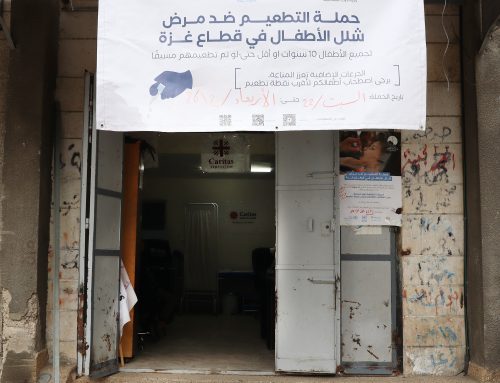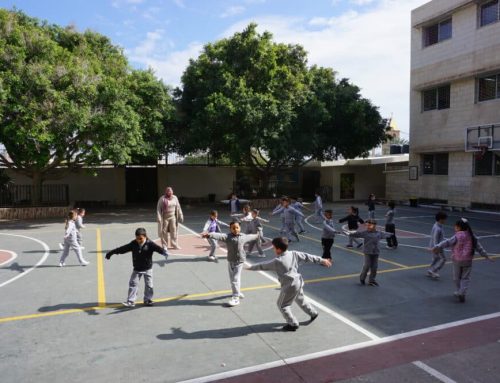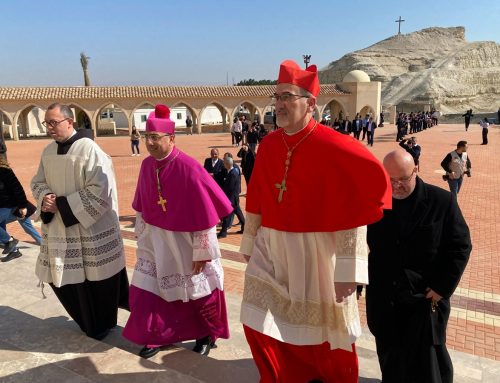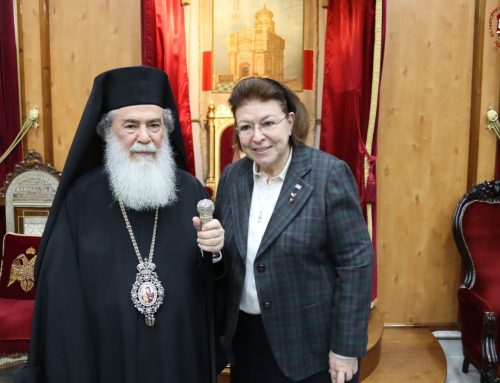Saliba Sarsar
If I am not for myself, who will be for me? But if I am only for myself, what am I? And if not now, when? Rabbi Hillel
Blessed are the peacemakers for they shall be called the children of God. Matthew 5:9
Beyond our ideas of right-doing and wrong-doing, there is a field. I’ll meet you there. Jelaluddin Rumi
History, despite its wrenching pain, / cannot be unlived, but if faced / With courage, need not be lived again. Maya Angelou
Across the millennia, people from all walks of life and faith traditions—prophets and poets; religious, spiritual, and secular—have spoken about the need to reach out to the other, to dialogue and pursue peace with the other, and to have the wisdom necessary for not repeating the mistakes of the past.
Using the theme of “Building Peace through Faith and Dialogue,” the Holy Land Christian Ecumenical Foundation (HCEF) held its 11th International Conference on October 24, 2009. The speakers, examining a variety of topics— religious faith as a path of peace, human security in the Holy Land, hope for a two-state solution, the media role in covering events in Israel/Palestine, the hardships encountered by women and children—touched on our responsibility to delve deeply into issues and become engaged in mobilizing support for a better future for the peoples of Holy Land. What HCEF stressed is the necessity to preserve the Christian presence in the Holy Land by strengthening bonds of solidarity between them and Christians elsewhere as well as by developing programs that provide spiritual, moral, and financial assistance to them.
In addition to becoming engaged in aspects of the HCEF mission, what participants at the HCEF conference expressed is a serious commitment to understanding and respecting the other, as well as the urgent need for communities to go beyond the parochial and the satisfaction of curiosity so as to build good “habits of the heart.” What the conference’s organization and success embodied are socially responsible leaders—religious and secular; educators and media experts; men and women; volunteers; Christian, Muslim, Jewish, and other—all set on achieving the commonly held objectives of peace and reconciliation.
Obviously, these values do not happen in a vacuum or of their own accord. They result from a cooperative effort of people of faith, broadly defined, who are engaged in dialogue and action towards positive change, toward a new beginning.
In his address at Cairo University on June 4, 2009, President Barack Obama spoke of a new beginning between the United States and Muslims around the world. “[I]n order to move forward,” he explained, “we must say openly to each others the things we hold in our hearts and that too often are said only behind closed doors. There must be a sustained effort to listen to each other; to learn from each other; to respect one another; and to seek common ground.”
President Obama’s vision has universal applicability, particularly in interfaith relations and dialogue, and is a requisite in our fractured world. As history has repeatedly shown, narrow religious identities and interpretations have led to religious passions and zealotry. These, in turn, have manipulated religious beliefs in the service of politico-ideological aims, which eventually caused conflicts and wars. While religious and secular leaders have tried to promote equity and societal harmony over the years, tensions remain.
Despite differences and similarities in our backgrounds and cultures, our beliefs as individuals and as a people give us not only historical and spiritual roots, but also a humane worldview, most necessary today.
As people of faith, we need to become more involved in self-reflection about the meaning in life and our role in the betterment of creation. In addition to knowing our individual rights and responsibilities, we must make moral sense of our lives and enhance our social responsibility towards all others, be they of the same ethnic, racial, and religious backgrounds or not.
In doing so, we exit from the shadow of mere existence and enter the limelight of fulfilled living. Our tendency to advance our own faith tradition becomes the path to other people’s faiths as well. Our discrete actions begin to embrace the other, leading us towards positive peace that encompasses human security, societal well-being, and social justice.
Families, communities, civic associations, and institutions of learning—all have an obligation to educate for leadership, dialogue, inclusion, tolerance, and peace. The church, the mosque, and the synagogue must redouble their efforts to become workshops for healing the world, for tending the garden, for living pluralism. If not there, where? If not now, when? If not us, who?
While the relationship between religious and secular affairs must be carefully balanced, governments at all levels are urged to promote dialogue and interfaith efforts. Public-private partnerships can also play a pivotal role in funding inclusion initiatives and peace education. Through proactive learning, compassionate listening, and dedicated service, individuals and groups can contribute in significant ways towards building caring and generous communities, where dignity and diversity of all peoples are appreciated and where social justice across borders, cultures, and generations is actualized.
It behooves all concerned to use faith and dialogue for advancing peace among Christians, Muslims, and Jews and between Palestinians and Israeli Jews. It behooves all to speak up and extend their helping hand to support the Living Stones of the Holy Land so as “to replace despair with hope, fear with security, and humiliation with human dignity.”
*Saliba Sarsar, founder of the Monmouth Dialogue Project, is Professor of Political Science and Associate Vice President for Academic Program Initiatives at Monmouth University.





